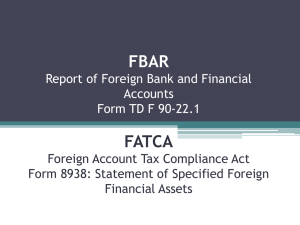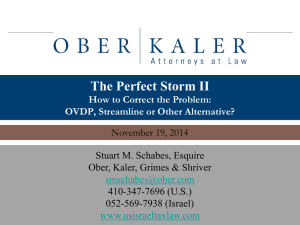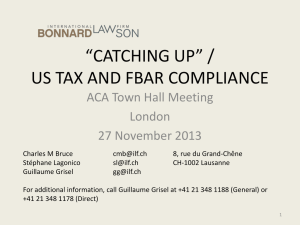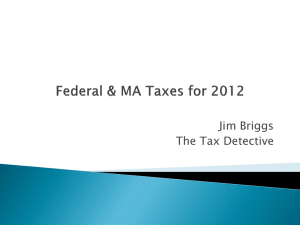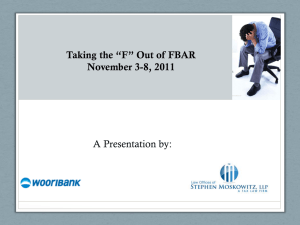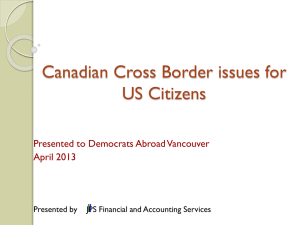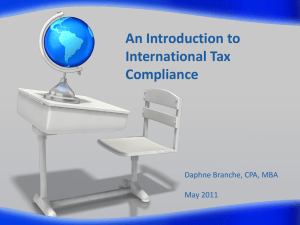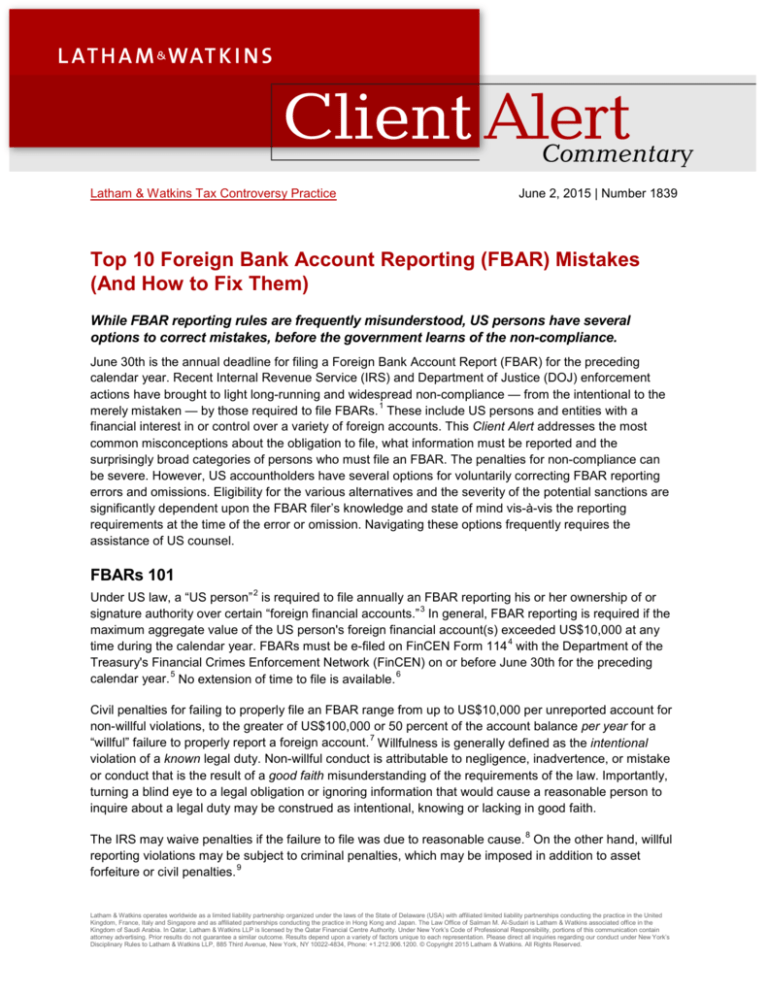
Latham & Watkins Tax Controversy Practice
June 2, 2015 | Number 1839
Top 10 Foreign Bank Account Reporting (FBAR) Mistakes
(And How to Fix Them)
While FBAR reporting rules are frequently misunderstood, US persons have several
options to correct mistakes, before the government learns of the non-compliance.
June 30th is the annual deadline for filing a Foreign Bank Account Report (FBAR) for the preceding
calendar year. Recent Internal Revenue Service (IRS) and Department of Justice (DOJ) enforcement
actions have brought to light long-running and widespread non-compliance — from the intentional to the
1
merely mistaken — by those required to file FBARs. These include US persons and entities with a
financial interest in or control over a variety of foreign accounts. This Client Alert addresses the most
common misconceptions about the obligation to file, what information must be reported and the
surprisingly broad categories of persons who must file an FBAR. The penalties for non-compliance can
be severe. However, US accountholders have several options for voluntarily correcting FBAR reporting
errors and omissions. Eligibility for the various alternatives and the severity of the potential sanctions are
significantly dependent upon the FBAR filer’s knowledge and state of mind vis-à-vis the reporting
requirements at the time of the error or omission. Navigating these options frequently requires the
assistance of US counsel.
FBARs 101
2
Under US law, a “US person” is required to file annually an FBAR reporting his or her ownership of or
3
signature authority over certain “foreign financial accounts.” In general, FBAR reporting is required if the
maximum aggregate value of the US person's foreign financial account(s) exceeded US$10,000 at any
4
time during the calendar year. FBARs must be e-filed on FinCEN Form 114 with the Department of the
Treasury's Financial Crimes Enforcement Network (FinCEN) on or before June 30th for the preceding
5
6
calendar year. No extension of time to file is available.
Civil penalties for failing to properly file an FBAR range from up to US$10,000 per unreported account for
non-willful violations, to the greater of US$100,000 or 50 percent of the account balance per year for a
7
“willful” failure to properly report a foreign account. Willfulness is generally defined as the intentional
violation of a known legal duty. Non-willful conduct is attributable to negligence, inadvertence, or mistake
or conduct that is the result of a good faith misunderstanding of the requirements of the law. Importantly,
turning a blind eye to a legal obligation or ignoring information that would cause a reasonable person to
inquire about a legal duty may be construed as intentional, knowing or lacking in good faith.
8
The IRS may waive penalties if the failure to file was due to reasonable cause. On the other hand, willful
reporting violations may be subject to criminal penalties, which may be imposed in addition to asset
9
forfeiture or civil penalties.
Latham & Watkins operates worldwide as a limited liability partnership organized under the laws of the State of Delaware (USA) with affiliated limited liability partnerships conducting the practice in the United
Kingdom, France, Italy and Singapore and as affiliated partnerships conducting the practice in Hong Kong and Japan. The Law Office of Salman M. Al-Sudairi is Latham & Watkins associated office in the
Kingdom of Saudi Arabia. In Qatar, Latham & Watkins LLP is licensed by the Qatar Financial Centre Authority. Under New York’s Code of Professional Responsibility, portions of this communication contain
attorney advertising. Prior results do not guarantee a similar outcome. Results depend upon a variety of factors unique to each representation. Please direct all inquiries regarding our conduct under New York’s
Disciplinary Rules to Latham & Watkins LLP, 885 Third Avenue, New York, NY 10022-4834, Phone: +1.212.906.1200. © Copyright 2015 Latham & Watkins. All Rights Reserved.
US persons with unreported foreign bank accounts are increasingly at risk of the IRS and DOJ identifying
those accounts due to the implementation of the Foreign Account Tax Compliance Act (FATCA). FATCA,
enacted in 2010 and implemented on July 1, 2014, requires foreign financial institutions worldwide to
perform in-depth due diligence and to collect information to identify any US accountholders or US
beneficial owners of financial assets abroad, and to automatically disclose account information annually
to the IRS.
The Top 10 FBAR Reporting Errors
1. Failure to File
By far, the most common FBAR reporting mistake is simply failing to file. Some US persons continue to
deliberately conceal assets in secret offshore bank accounts in the hope of evading US tax authorities. In
many other cases, however, Americans living and working outside the US, recent immigrants, foreign
citizens who are resident in the US, and US children who received gifts or bequests from their foreign
parents are simply unaware of their FBAR filing obligations. Despite well publicized enforcement actions
against financial institutions and individual accountholders, as well as corresponding amnesty programs,
many US persons with foreign financial accounts remain unaware of the FBAR reporting obligations.
US persons with ownership or signature authority over foreign financial accounts should obtain complete
copies of their account records and fully educate themselves regarding FBAR reporting obligations and,
when necessary, seek advice from US tax professionals in advance of the June 30th filing deadline.
Those who fail to resolve prior reporting errors can expect harsh treatment from US tax authorities and
remain exposed to substantial penalties and possible criminal prosecution. Similarly, US courts have not
been sympathetic to uninformed foreign accountholders who failed (deliberately or otherwise) to
investigate their reporting obligations. In some cases, US courts have imposed a penalty equal to 50
percent of the highest account balance for each year that remained open under the statute of
10
limitations. Many who deliberately concealed offshore bank accounts have been prosecuted and
received prison terms.
2. Misunderstanding the US$10,000 Filing Threshold
FBAR reporting is required if the aggregate value of the US person's foreign financial accounts exceeds
US$10,000 at any time during the calendar year. There are three common misconceptions about this
US$10,000 filing threshold:
First Misconception: The US$10,000 reporting threshold is determined on an account-by-account basis.
The Rule: The reporting threshold is determined on an aggregate basis by adding the highest reported
balance of every foreign account that the US person owned or over which he or she had signature
authority during the calendar year. Thus, signature authority over a corporate account with a “high
balance” of US$6,000 and maintenance of a personal account with a “high balance” of US$6,000 requires
filing an FBAR reporting both accounts because the aggregate value of the accounts exceeds
US$10,000.
Second Misconception: An account with a balance under US$10,000 does not need to be reported on an
FBAR.
The Rule: A person required to file an FBAR must report all of his or her foreign financial accounts,
including any accounts with balances under US$10,000 (as illustrated above). Likewise, if the reporting
Latham & Watkins
June 2, 2015 | Number 1839 | Page 2
obligation is triggered because a person has mere signature authority over corporate accounts 11 with a
maximum aggregate balance of more than US$10,000, all personally maintained foreign accounts must
also be reported, regardless of size.
Third Misconception: The filing obligation is triggered only if the maximum aggregate balance exceeds
US$10,000 at year-end.
The Rule: The reporting obligation is triggered if the maximum aggregate balance exceeds US$10,000 at
any time during the calendar year. The regulations permit an accountholder to rely on the balance
reported in a periodic (i.e., monthly) statement, as long as the statement “fairly reflects” the maximum
account balance during the year. For example, if large amounts were deposited and withdrawn in a single
month that substantially reduced the reported value at month-end, then, depending on the circumstances,
the accountholder may not reasonably rely on the month-end statement when determining the maximum
account balance. For an account holding foreign currency, the FBAR instructions provide that an
accountholder should convert the monthly foreign currency balance to US dollars using the Treasury's
Financial Management Service rate (select Exchange Rates under Reference & Guidance at
www.fms.treas.gov) for the last day of the calendar year.
Notably, the FBAR filing thresholds and other requirements for reporting foreign assets are different from
those applicable to filing IRS Form 8938, Statement of Specified Foreign Financial Assets. Form 8938 is
filed annually with a US Federal Income Tax Return (Form 1040) and requires information reporting on a
variety of “specified foreign financial assets,” as defined therein. For example, financial accounts held at a
foreign branch of a US financial institution must be reported on an FBAR but need not be reported on
Form 8938.
3. Failure to Report Beneficial Ownership
As a general rule, any US person who has “signature or other authority” over, or is the owner of record of
or holder of legal title to, a foreign financial account is required to file an FBAR, if the aggregate value of
that person’s or entity’s foreign financial accounts exceeds US$10,000 at any time during the calendar
12
year. Under the regulations, the test for whether a person has signature or other authority over an
account is whether the foreign financial institution will “act upon a direct communication from that
13
individual regarding the disposition of assets in the account.” If the financial institution or accountholder
requires authorization from more than one individual, every individual who is authorized to direct the bank
regarding the disposition of an asset is considered a signatory. In simple terms, if an account is in a
person’s name or if he or she can sign a check, withdraw funds, direct investments, issue instructions to
the bank (alone or in conjunction with another person), etc., then he or she may be required to file an
FBAR.
The obligation to file an FBAR extends well beyond signatories and legal accountholders and includes
any US person who has a “financial interest” in a foreign financial account. The term “financial interest” is
broadly defined in the regulations and generally includes a US person who is a beneficial owner of the
assets in the account, even though he or she may not be identified as the legal accountholder in the
14
records of the financial institution or able to communicate directly with the financial institution. Thus, a
US person is required to file an FBAR if the owner of record or holder of legal title of the account is acting
15
on the person’s behalf as an agent, nominee, attorney or in “some other capacity.” For example, if a
brother who resides overseas agrees to hold US$15,000 of a sister’s money in his foreign bank account,
the sister has a reportable “financial interest” in the foreign financial account and is required to file an
FBAR even though she is not a signatory to, or legal title holder of, the account. Similarly, if US siblings
inherit money from their mother and leave the funds in her estate's foreign bank account, the siblings also
Latham & Watkins
June 2, 2015 | Number 1839 | Page 3
have a reportable financial interest in the estate’s foreign financial account and each sibling is required to
file an FBAR. This is true even if the siblings’ funds are comingled in one account (assuming the
aggregate value of each reporting sibling’s interest in all foreign accounts exceeds US$10,000). The
regulations also require reporting in various other circumstances, including situations in which a US
16
person creates an entity to conceal his or her beneficial interest in an attempt to avoid FBAR reporting.
Therefore, if a US or foreign person or entity holds assets in a foreign financial account on behalf of a US
person, the US person must investigate his or her FBAR reporting requirements, and, when in doubt, file
to avoid the risk of substantial penalties.
4. Failure to Report Life Insurance, Retirement, and Other Non-traditional Financial
Accounts
The definition of “financial account” is far broader than a traditional checking or savings account at a
bank, and also includes, inter alia, certificates of deposit, passbook accounts, securities (investment)
accounts, accounts with a person that acts as a broker-dealer for futures or options transactions, and
17
mutual funds or similar pooled funds. Notably, the definition also expressly includes an insurance or
18
annuity policy with a cash value.
In many circumstances, foreign retirement accounts must be reported on FBARs. Narrow exceptions
apply to foreign financial accounts that are held by an IRA and to participants in certain tax-qualified
19
retirement plans. In general, foreign “Social Security-type” program benefits provided by a foreign
20
government need not be reported. However, these reporting exceptions are limited and do not exclude
from FBAR reporting many common retirement plans and vehicles found throughout the world. A US
person who is an owner or beneficiary of foreign retirement assets, life insurance and annuities with cash
value, and other non-traditional “accounts” should investigate whether FBAR reporting is required for the
specific type of retirement account at issue. When in doubt, the account should be reported to avoid the
risk of substantial penalties.
Internal IRS guidance notes that individual bonds, notes or stock certificates which a filer holds do not
21
constitute a financial account for FBAR reporting purposes. IRS officials have publicly stated that US
persons are not currently expected to report Bitcoin or other virtual currency on FBARs, but have
22
cautioned that this position may change in the future.
5. Failure to File by a US LLC, Partnership, Disregarded Entity or Estate
Another Common Misconception: LLCs and trusts treated as disregarded entities under US tax law are
not required to file FBARs.
The Rule: The federal tax treatment of an entity is not determinative of whether the entity has an FBAR
filing requirement. Corporations, partnerships, limited liability companies (LLCs), trusts and estates
formed or organized under the laws of the United States all fall within the definition of a US person
23
required to file an FBAR. Thus, a Nevada or Delaware LLC treated as a disregarded entity is still
required to file an FBAR if it maintains foreign financial account(s) with a maximum aggregate balance of
more than US$10,000. This is the case even if the owner of the LLC is foreign (i.e., not a US taxpayer).
6. Failure to File an Individual Report by the Majority Owner of a Business Entity
A US person who owns, directly or indirectly, “(i) more than 50 percent of the total value of shares of stock
or (ii) more than 50 percent of the voting power of all shares of stock” of a US or foreign corporation is
treated as the owner of the corporation's foreign financial accounts for FBAR reporting purposes and is
24
required to file an FBAR on his or her own behalf reporting the corporation's foreign financial accounts.
Latham & Watkins
June 2, 2015 | Number 1839 | Page 4
The rules apply similarly to a majority partner in a partnership or majority owner of any other entity. A US
person who owns, directly or indirectly, “(i) an interest in more than 50 percent of the partnership's profits
(e.g., distributive share of partnership income taking into account any special allocation agreement) or (ii)
an interest in more than 50 percent of the partnership capital” is treated as the owner of the partnership's
foreign financial account(s) for FBAR reporting purposes and is required to file an FBAR on his or her
25
own behalf reporting the partnership's foreign bank accounts. FBAR reporting is also required regarding
the foreign financial accounts of any other entity (including a disregarded entity for tax purposes) in which
a US person owns, directly or indirectly, more than 50 percent of the voting power, total value of equity
26
interest or assets, or interest in profits.
Significantly, these personal filing obligations are separate from any obligation that the business entity in
which the person holds a majority interest may have. Accordingly, if the corporation, partnership or other
entity is a US person, then the entity itself may also be required to file an FBAR. If either the entity or
signatory files an FBAR, such a filing does not relieve the majority owner of his or her personal FBAR
filing obligations.
Again, the US$10,000 reporting threshold is determined on an aggregate basis by adding the highest
reported balance of every foreign account in which the US person has a financial interest — or over which
he or she has signature or other authority — during the calendar year (including financial accounts held in
the name of an entity or nominee), and is not determined on an account-by-account basis. For example,
the controlling shareholder of a corporation with a foreign corporate account holding a high balance of
US$6,000 who also maintained a personal foreign financial account with a high balance of US$6,000 is
required to file an FBAR and report both accounts because the aggregate value of his foreign financial
accounts exceeds US$10,000.
7. Failure to File by the Trustee, Grantor or Beneficiary of a Trust
Several rules related to US and foreign trusts cause confusion. First, as noted above, a US trust that
maintains foreign financial account(s) with a maximum aggregate balance in excess of US$10,000 must
27
file an FBAR. This reporting obligation applies even if the trust is treated as a disregarded entity for US
federal income tax purposes (such as a US grantor trust). Second, any US person who has signature or
other authority over a US or foreign trust's foreign financial account(s) (e.g., a US trustee) is also required
28
to file an FBAR in his or her capacity as a signatory on the account.
In addition to the basic requirements noted above, a US person who (i) is the trust grantor and (ii) has an
29
ownership interest in the trust for US federal tax purposes is treated as the owner of the trust's foreign
financial account(s) for FBAR reporting purposes and must file an FBAR reporting the trust's foreign bank
30
accounts. This is a personal filing obligation and is in addition to the trust's filing obligations.
The rules for a trust beneficiary are slightly different. A US person who is the beneficiary of a foreign or
US trust is treated as the owner of the trust's foreign financial accounts for FBAR reporting purposes and
is required to file an FBAR reporting the trust's foreign bank accounts if the person has a greater than 50
31
percent present beneficiary interest in the assets or income of the trust for the calendar year. However,
under the regulations, such a beneficiary may avoid FBAR reporting if the trust, trustee, or agent of the
32
trust is a US person who files an FBAR disclosing the trust's foreign financial account(s). This limited
exception only applies to beneficiaries and does not apply to grantors or trustees. When in doubt, the
beneficiary should file an FBAR reporting the trust's account(s) to avoid the risk of substantial penalties.
Latham & Watkins
June 2, 2015 | Number 1839 | Page 5
8. Filing of Joint FBARs by Spouses, Except in Limited Circumstances
Spouses are permitted to file a joint FBAR only in limited circumstances. The FBAR instructions permit
one spouse to file on behalf of the other only if all of the following three conditions are met: “(1) all the
financial accounts that the non-filing spouse is required to report are jointly owned with the filing spouse;
(2) the filing spouse reports the jointly owned accounts on a timely filed FBAR electronically signed; and
(3) the filers have completed and signed FinCEN Form 114a Record of Authorization to Electronically File
33
FBARs.” In other words, if the non-filing spouse owns or has signature authority on an account that the
filing spouse is not required to report, then both spouses must file separate FBARs.
The requirement to prepare and retain the Form 114a authorization is not well known. Treasury's
Instructions to Forms 114 and 114a specifically state that if a spouse files a joint FBAR, the non-filing
spouse must formally designate the filing spouse as his or her “third party preparer” by signing and
34
retaining the Form 114a authorization (duly executed by both spouses). The better practice is for each
spouse to file separate FBARs, which avoids the risk that the IRS might later determine that either spouse
failed to meet the FBAR requirements.
9. Failure to File by Minor Children
Minor children who are US citizens or residents must file FBARs if they are the owners or signatories of
35
foreign financial account(s) that meet the US$10,000 aggregate threshold. All the same filing
requirements discussed above (including, but not limited to, beneficial ownership and trusts) apply equally
36
in the case of a minor child. The FBAR instructions explain: “Generally, a child is responsible for filing
his or her own FBAR. If a child cannot file his or her own FBAR for any reason, such as age, the child's
parent, guardian or other legally responsible person must file it for the child.”
10. Failure to Comply with Bank Secrecy Act (BSA) Record Retention Requirements
In addition to filing an FBAR, a US person who falls within the FBAR filing requirements is also obligated
37
to maintain certain information and records relating to foreign financial accounts for five years. The
records which must be retained include the following: (1) the name of the accountholder; (2) the account
number; (3) the name and address of the financial institution; (4) the type of account; and (5) the
38
maximum value of each account during the reporting period. A complete and accurate FBAR (that
includes all of the above information) will satisfy these record retention requirements. Nevertheless, the
better practice is to retain complete copies of bank statements for all foreign financial accounts to support
39
the FBAR for at least six years from the due date of the FBAR, which is the limitations period. The
penalties for failing to maintain adequate foreign account records are the same as those for failing to file a
40
timely and accurate FBAR.
Correcting Common FBAR Errors
Currently, the IRS offers four options to fix FBAR mistakes. Participation in the two formal disclosure
programs is permitted only if the funds held in the foreign financial account(s) are from a legal source
(and not the proceeds of an illegal activity) and if the IRS is not already in a position to know of the
person’s non-compliance.
1. File an Amended FBAR
According to the FBAR instructions, a person who previously filed an FBAR but mistakenly provided
41
incomplete or inaccurate information on the Form is required to file an amended FBAR. FinCEN Form
114 includes a box for providing a brief explanation of the error. Because of the six-year statute of
limitations, a filer need not correct an error on an FBAR filed more than six years ago.
Latham & Watkins
June 2, 2015 | Number 1839 | Page 6
Filing an amended or delinquent FBAR outside one of the IRS's penalty relief programs does not afford
any penalty protection and therefore requires careful consideration. The IRS may impose penalties if it
later determines that the FBAR error was willful or due to negligence. On the other hand, no penalties
may be imposed under the law if the error was due to reasonable cause (i.e., an innocent mistake). Even
if the error was not due to reasonable cause, under the IRS's penalty mitigation guidelines, the IRS has
discretion to determine that a penalty would be inappropriate and may instead issue an FBAR warning
42
letter.
2. File Pursuant to the IRS's Delinquent FBAR Submission Procedures
A person who has not previously filed an FBAR, but who has properly filed federal income tax returns that
fully reported the income from any foreign account(s), may be eligible for the IRS's Delinquent FBAR
43
Submission Procedures. Under the Delinquent FBAR Submission Procedures, “[t]he IRS will not impose
a penalty for the failure to file the delinquent FBARs if you properly reported on your U.S. tax returns, and
paid all tax on, the income from the foreign financial accounts reported on the delinquent FBARs, and you
have not previously been contacted regarding an income tax examination or a request for delinquent
44
returns for the years for which the delinquent FBARs are submitted.”
This is a simple procedure. The US person should e-file the delinquent FBAR and include a brief
statement that explains why the FBAR is being filed late. Although not required by the procedures, the
explanation should also reference that the FBAR is being filed pursuant to the “IRS's Delinquent FBAR
Submission Procedures.”
3. File Pursuant to the IRS's Streamlined Filing Compliance Procedures
The IRS's Streamlined Filing Compliance Procedures (commonly referred to as the “Streamlined Offshore
Program”) are available for a resident or non-resident US person who mistakenly failed to file an FBAR
45
and/or failed to report on a US tax return income related to foreign financial account(s). These
procedures are also available for a non-resident US taxpayer who failed to file a federal income tax return
(i.e., Form 1040). In general, a taxpayer is eligible to participate in the Streamlined Program if his or her
46
failure to file a US tax return and/or FBAR was not willful. The Streamlined Program requires a
participant to file federal income tax returns (or amended returns) for three prior years and FBARs for six
prior years, along with a declaration (signed under penalties of perjury) attesting that his or her failure to
file was not willful. A false certification could expose a disclosing taxpayer to potential civil fraud, FBAR
and information return penalties, as well as criminal liability.
In general, under the terms of the Streamlined Program, the IRS will not impose any penalties on a
participating non-resident taxpayer. For a taxpayer resident in the US, the IRS will impose (1) accuracy
penalties (20 percent) on the unreported tax, and (2) an FBAR-type penalty equal to five percent of the
maximum aggregate balance in the unreported foreign financial account(s) during the six-year period.
47
The Streamlined Procedures are fully described on the IRS's website. Note that a taxpayer currently
under examination is not eligible for the Streamlined Program.
4. Apply to Participate in the IRS's Offshore Voluntary Disclosure Program (OVDP)
The current iteration of the OVDP program is intended to help those taxpayers who knowingly violated the
48
tax laws to come back into compliance and avoid criminal prosecution. In general, this program requires
a taxpayer to file eight prior years’ tax returns and FBARs, provide detailed information regarding any
unreported foreign financial account(s), and pay all taxes, accuracy penalties, delinquency penalties (up
to 47.5 percent of the tax due), and interest due for the eight-year period. In addition, the IRS imposes an
FBAR-type civil penalty equal to 27.5 percent of the single maximum aggregate balance in the unreported
foreign financial accounts during the eight-year period. The penalty is increased to 50 percent if the IRS
Latham & Watkins
June 2, 2015 | Number 1839 | Page 7
or DOJ has initiated an investigation of the financial institution in which the accounts are held.
Nevertheless, this program remains a potentially attractive option for a US person otherwise exposed to
even greater civil penalties or potential criminal prosecution.
When to Engage Legal Counsel
In some cases, legal counsel is not necessary to correct a minor mistake on a previously filed FBAR or to
file a delinquent FBAR if the failure to file was an innocent mistake. However, a US person concerned
that the government may view the errors or omissions as “willful” should engage legal counsel to fully
evaluate the facts and circumstances, assess the potential civil and criminal exposure, discuss the
benefits and burdens of these various options and explore the optimal solution in each case. A US person
with an unreported account at a Swiss financial institution or in a jurisdiction which the US government
considers a tax haven, or who maintained an account at a foreign financial institution currently under
49
investigation for assisting US taxpayers with evading tax, should immediately consult with legal counsel,
regardless of whether he or she believes the prior conduct was willful.
The attorney-client privilege provides a critically important protection allowing any analysis of whether the
person's conduct may be viewed by the government as willful or criminal to remain protected from
disclosure to the IRS. Bear in mind that communications with accountants or non-lawyer tax practitioners
in a potential criminal tax matter are not covered by any attorney-client or similar privilege.
None of these correction options is available to a US person who is already under IRS audit or whose
non-compliance has already been identified by the government. Thus, time is of the essence to correct
FBAR mistakes, particularly in light of new requirements on foreign banks to disclose US accountholders
to the IRS under FATCA.
If you have questions about this Client Alert, please contact one of the authors listed below or the Latham
lawyer with whom you normally consult:
Miriam L. Fisher
miriam.fisher@lw.com
+1.202.637.2178
Washington, D.C.
Brian C. McManus
brian.mcmanus@lw.com
+1.202.637.2173
Washington, D.C.
You Might Also Be Interested In
Foreign Banks and Bankers Face New Risks From Swiss Bank Amnesty
Bandfield Confirms Aggressive FATCA Enforcement Tactics
Beyond Switzerland: Preparing for the Fallout from FATCA and Other Global Transparency Initiatives
IRS Eases Access to Offshore Voluntary Disclosure Programs
6 Reasons US Taxpayers Should Report Assets Held in Swiss Banks Soon
Latham & Watkins
June 2, 2015 | Number 1839 | Page 8
Client Alert is published by Latham & Watkins as a news reporting service to clients and other friends.
The information contained in this publication should not be construed as legal advice. Should further
analysis or explanation of the subject matter be required, please contact the lawyer with whom you
normally consult. The invitation to contact is not a solicitation for legal work under the laws of any
jurisdiction in which Latham lawyers are not authorized to practice. A complete list of Latham’s Client
Alerts can be found at www.lw.com. If you wish to update your contact details or customize the
information you receive from Latham & Watkins, visit http://events.lw.com/reaction/subscriptionpage.html
to subscribe to the firm’s global client mailings program.
Endnotes
1
Since 2009, more than 50,000 accountholders have voluntarily contacted the IRS to resolve issues related to unreported foreign
financial accounts.
2
The term “US person” includes a US citizen, resident or entity created or organized in the United States, including a US
corporation, partnership, LLC, trust, estate, etc. See 31 CFR § 1010.350(b)(1). This definition is separate and distinct from the
Internal Revenue Code's definitions of persons that are required to file US tax returns.
3
31 U.S.C. § 5314; 31 CFR § 1010.350. Inter alia, an account held with a branch of a US financial institution located outside the
United States is considered a foreign financial account.
4
The predecessor FBAR Form was TDF 90-22.1.
5
See 31 U.S.C. § 5314; 31 CFR § 1010.306 (June 30th FBAR filing deadline).
6
Moreover, Internal Revenue Code § 7508 does not extend the FBAR filing deadline for members of the Armed Forces in combat
zones.
7
31 U.S.C. § 5321(a)(5)(C). On May 29, 2015, the IRS publicly released an internal memorandum (dated May 13, 2015) jointly
authored by the Commissioners of three IRS operating divisions — Large Business and International (LB&I), Small Business
and Self-Employed (SB/SE) and Tax Exempt and Government Entities (TE/GE) — entitled "Interim Guidance for Report of
Foreign Bank and Financial Accounts." The Memorandum sets forth the IRS's current policies and practices for imposing FBAR
penalties. Significantly, although the IRS is statutorily authorized to impose a penalty of 50 percent per year, the Memorandum
states, "In most cases, the total penalty amount for all years under examination will be limited to 50 percent of the highest
aggregate balance of all unreported foreign financial accounts during the years under examination," i.e., a single 50 percent
penalty. The Memorandum further states, "Examiners may recommend a penalty that is higher or lower than 50 percent of the
highest aggregate account balance of all unreported foreign financial accounts based on the facts and circumstances. In no
event will the total penalty amount exceed 100 percent of the highest aggregate balance of all unreported foreign financial
accounts during the years under examination."
8
31 U.S.C. § 5321(a)(5)(B)(ii). The IRS's penalty mitigation guidelines are set forth in the Internal Revenue Manual at Exhibit
4.26.16-2 (Normal FBAR Penalty Mitigation Guidelines for Violations Occurring After October 22, 2004 revised as of July 1,
2008).
9
31 U.S.C. § 5321(d).
10
The statute of limitations for assessment of an FBAR penalty is six years from the due date of the FBAR. See 31 U.S.C. §
5321(b). Unlike the statute of limitations for federal tax returns, the statute of limitations for an FBAR begins to run on the due
date of the FBAR regardless of whether the FBAR is filed.
11
Beginning in 2011, the deadline for individuals with signature authority over, but no financial interest in, certain corporate
accounts was extended by FinCEN. See FinCEN Notice 2011-1 and 2011-2. This limited extension only applies to corporate
account signatories who may otherwise be exempt from filing under 31 CFR § 1010.350(f)(2)(i)-(v). Further extensions were
announced in Notices 2012-1, 2012-2, 2013-1 and 2014-1. These extensions generally apply to officers and employees of
certain examined banks and financial institutions; officers and employees of an entity registered with and examined by certain
other regulatory authorities; officers and employees of an entity with securities or American Depository Receipts (ADRs) listed
on a US national securities exchange; officers and employees of a US subsidiary of a US entity with securities or ADRs listed on
a US national securities exchange; and officers and employees of an entity that has a class of equity securities or ADRs
registered under section 12(g) of the Securities Exchange Act of 1934.
12
31 CFR § 1010.350.
13
See 31 CFR § 1010.350(f); see also the Preamble to the Final FBAR Regulations, 76 Fed. Reg. 10,234, 10,236 (Feb. 24, 2011)
(describing the "test" for signature authority).
14
See 31 CFR § 1010.350(e)(2)(i).
Latham & Watkins
June 2, 2015 | Number 1839 | Page 9
15
Id.
16
31 CFR § 1010.350(e)(2),(3).
17
31 CFR § 1010.350(c) (describing types of reportable accounts).
18
31 CFR § 1010.350(c)(3)(ii).
19
31 CFR § 1010.350(g)(5).
20
Id.
21
See Internal Revenue Manual § 4.26.16.3.2.
22
See Virtual Currency May Be Reportable On FBAR In Future, 2014 TNT 108-2 (June 5, 2014); see also IRS Notice 2014-21
(IRS Virtual Currency Guidance) (April 14, 2014); Guidance on the Application of FinCEN's Regulations to Persons
Administering, Exchanging, or Using Virtual Currencies, FIN-2013-G001 (March 18, 2013). Compare United States v. Hom, No.
C 13-3721 WHA (N.D. Cal. June 4, 2014) (online gambling accounts subject to FBAR reporting).
23
31 CFR § 1010.350(b)(3).
24
31 CFR § 1010.350(e)(2)(ii).
25
Id.
26
Id.
27
31 CFR § 1010.350(b)(3) (definition of US person); see also BSA Electronic Filing Requirements For Report of Foreign Bank
and Financial Accounts (FinCEN Form 114) (June 2014) (hereinafter FinCEN Form 114).
28
31 CFR § 1010.350(f) (FBAR filing requirements for US persons with signature or other authority).
29
The determination of whether the trust grantor has an ownership interest in the trust is made under Internal Revenue Code §§
671-679.
30
31 CFR § 1010.350(e)(iii).
31
Id.
32
31 CFR § 1010.350(g)(5).
33
FinCEN Form 114.
34
Id.
35
Id.
36
Id.
37
31 CFR § 1010.420.
38
Id.
39
See 31 U.S.C. § 5321(b) (six-year statute of limitations). The Internal Revenue Manual instructs agents to request records for
the underlying account. See Internal Revenue Manual § 4.26.16.3.8.
40
31 U.S.C. § 5321(a)(5)(C).
41
FinCEN Form 114.
42
See Internal Revenue Manual Exhibit 4.26.16-2.
43
See http://www.irs.gov/Individuals/International-Taxpayers/Delinquent-FBAR-Submission-Procedures.
44
Id.
45
See http://www.irs.gov/Individuals/International-Taxpayers/Streamlined-Filing-Compliance-Procedures.
46
A taxpayer who was negligent is eligible to participate in the Streamlined Offshore Program.
47
See http://www.irs.gov/Individuals/International-Taxpayers/Streamlined-Filing-Compliance-Procedures.
48
See http://www.irs.gov/Individuals/International-Taxpayers/Offshore-Voluntary-Disclosure-Program-Frequently-AskedQuestions-and-Answers-2012-Revised.
49
The IRS maintains on its website a list of financial institutions that are publicly known to be under investigation:
http://www.irs.gov/Businesses/International-Businesses/Foreign-Financial-Institutions-or-Facilitators.
Latham & Watkins
June 2, 2015 | Number 1839 | Page 10

